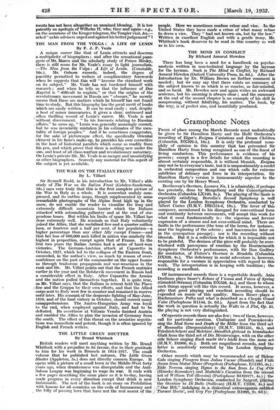Gramophone Notes
Plans of place among the March Records must undoubtedly be given to Sir Hamilton Harty and the Halle Orchestra's recording of Elgar's Enigma Variations and Dream Children (Columbia, DX322-5, 165.). It is only • the profound xeno- hily of opinion in this country that has prevented Sir
• ton Harty from being recognised as one of the finest of living conductors. This performance is evidence of his powers ; except in a few details for which the recording is almost certainly responsible, it is without blemish. Enigma may not be to everyone's taste, but it is unquestionably a model in orchestral composition and one which calls for extreme subtleties of delicacy and force in its interpretation. Sir Hamilton Flarty's version is immeasurably superior to the existing one by Sir Henry Wood.
Beethoven's Overture, Leonora No. 1 is admirably, if perhaps too precisely, done by Mengelberg and the Concertgebouw Orchestra (Columbia L.X160, 6s.). The playing of the finale is especially satisfying. Borodin's Second Symphony is well played by the London Symphony Orchestra, conducted by Albert Coates (H.M.V. DBI554-6, 18s.). The laver of this composer, accustomed to his disregard for conventional form and continuity between movements, will accept this work for what it most fundamentally is : the vigorous and fervent expression of a sincere and not over-critical mind. There are faults in the performance (the tone of the horns, for instance, near the beginning of the scherzo ; and inaccuracies later on in the syncopation passage) ; nor is the recording , without blemish. But it is a collection for which it is impossible not to be grateful. The denizen of the piers will probably be over- whelmed with paroxysms of emotion by the Bournemouth Symphony Orchestra's performance, with Sir Dan Godfrey for conductor, of Flotow's Overture to Stradelta (Columbia DX*26, 4s). The deficiency in social adventure is, however, responsible fora vacuum in appreciation with regard to this work. The interpretation is in keeping with tradition ; the recording is excellent.
Of instrumental records there is a regrettable dearth. Aida Dorfman plays Sauer's Echoes of Vienna and Voices of Spring (Granfeld-Strauss) (Columbia DX328, 4s.), and those to whom such things appeal will like this record. It seems, however, a - pity that good playing and excellent recording should be expended on music of this quality. Simon Bauer :plays a ' Rachmaninov Polka and what is described as a Chopin Grand Valse (Parlophone R1144, 2s. 6d.). Apart from the tact that the work in question is actually the Waltz in A Flat, Op. 42, the playing is not very distinguished.
Of operatic records there are also few; two of them, however, call for particular mention. Chaliapine and Pozemkovsky sing the Mad Scene and Death of the Miller from the third act of Eoussalka (Dargomizhsky) (H.M.V. DB1581, 6a.), and Friedrich Schorr and Melchior Abendlichgluhend in himmliacher Gluth from the third act of Die Meistersinger, with on the other side Schorr singing Euch macht ihr's leicht from the same act (H.M.V. D2000, Os.). Both are magnificent records, and the -latter is sensitively recorded by the London Symphony Orchestra.
Other records which may be recommended arc of Helene iGals singing Piangero from Julius Caesar (Handel) and Via Bunm from Stalest Mater (Pergolesi) (Parlophone, E11195, to.) ; Fide Norena singing. Hymn to the Sun _from Le Coq ,d'Or (Rimsky-Korsakov) and Mathilde's.Cavatina from the second ' sack of William Tell (Rossini) (Yarlophone R020177, -4s.) ; the London Symphony Orchestra, .conducted-by.. Sargent: PI-43*W the 'Overture to Di Ballo (Sullivan) (H.M.V.C2808, as.) and Our BILL"- -indulging in-a- ,extravaganZa_ entitled 1'urmut Iloein', and Guy Ron Parlophone R1066.,






































 Previous page
Previous page